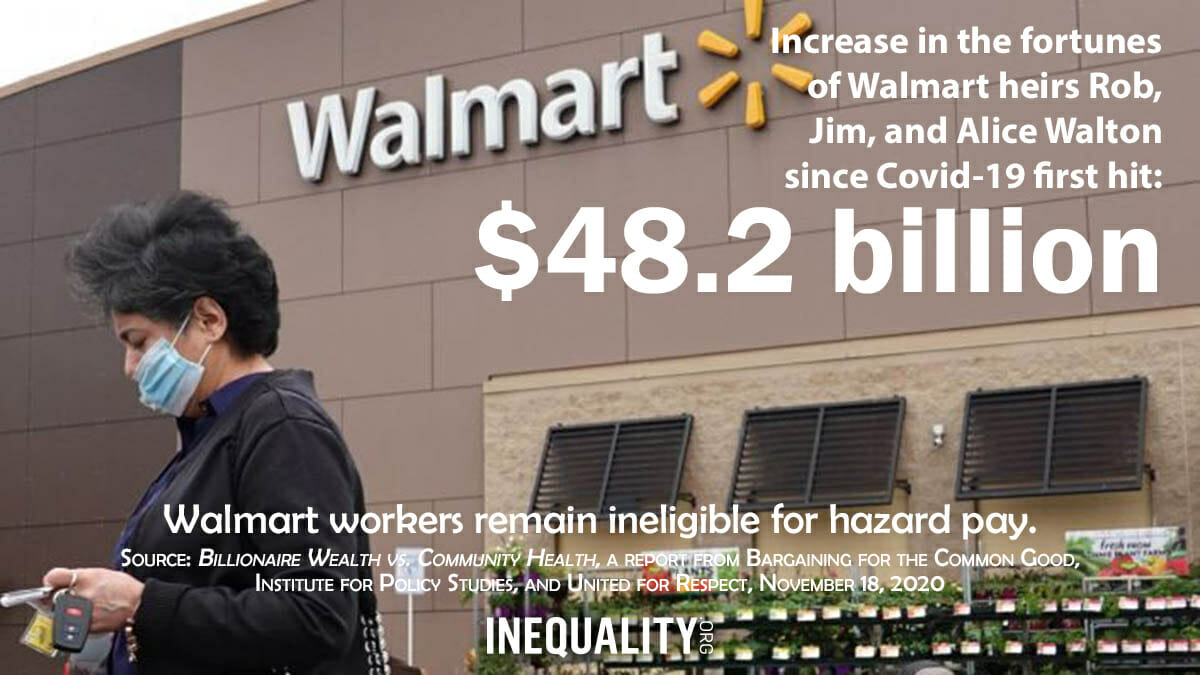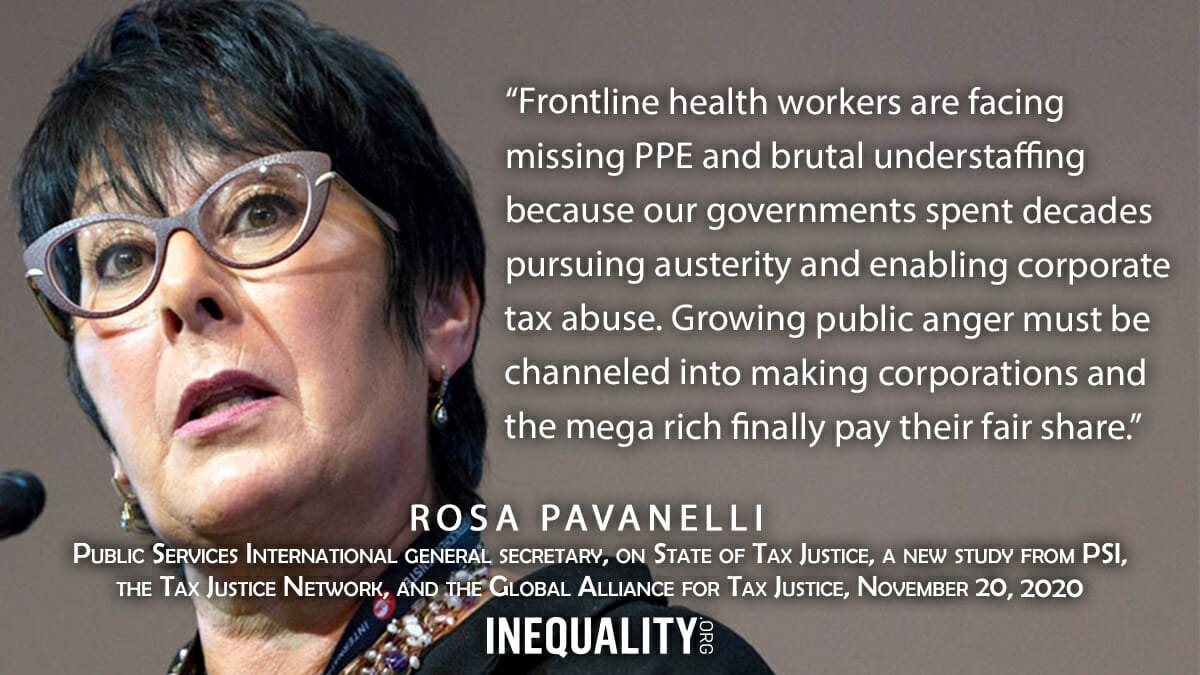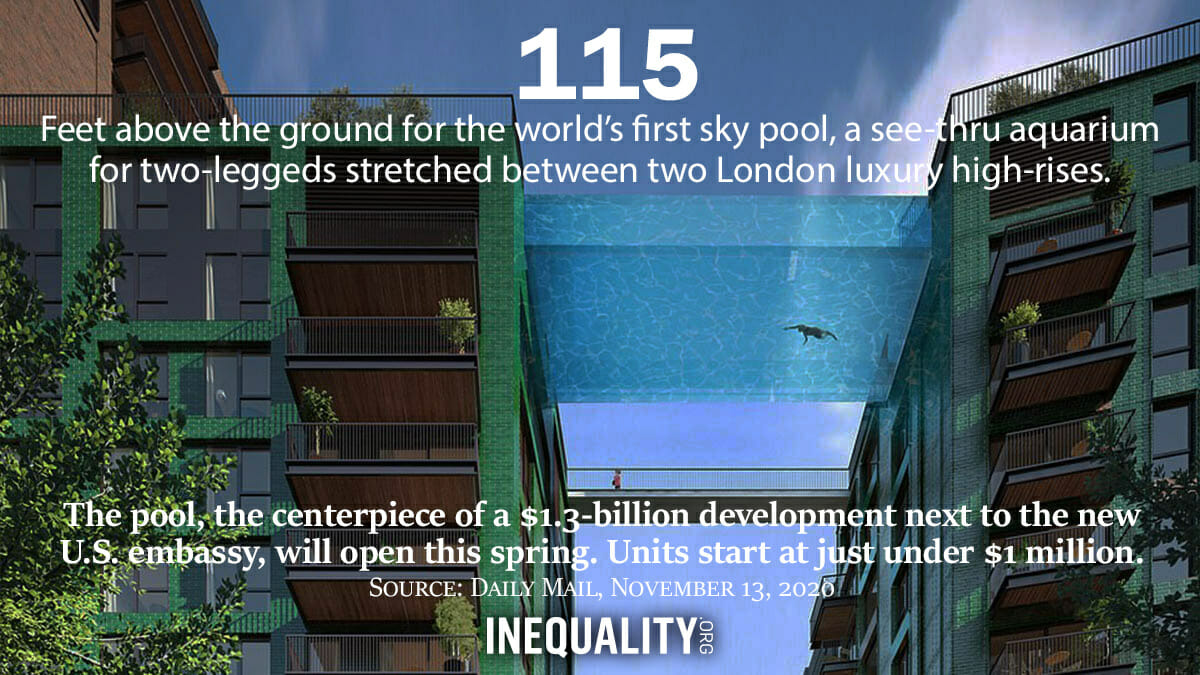| THIS WEEK |
I vividly remember — and I suspect you might do as well — the reporting last spring on the horrific spread of Covid-19 through the nation’s meatpacking plants. Workers were dying while the White House, instead of ordering corporate giants to keep their workers safe, cut a deal with those same giants that “ ordered” them to keep their plants open.
The predictable result: a bonanza for top execs like billionaire John Tyson at Tyson Foods. Tyson’s personal net worth has so far jumped over $600,000 since the pandemic first hit, dollars that could have gone to giving Tyson workers sick time pay to help them isolate and quarantine.
The worst part of all this? The deadly greed we’ve seen in meatpacking has in no way been unique. Our Institute for Policy Studies inequality team documents that reality in a new report we’ve prepared with the advocacy groups Bargaining for the Common Good and United for Respect. We have more on our new research in this week’s issue. Please take a look — at what has gone so lethally wrong and how we can fix it.
Chuck Collins, for the Institute for Policy Studies Inequality.org team |
|
| |
|
| INEQUALITY BY THE NUMBERS |
 |
|
|
|
| |
|
| FACES ON THE FRONTLINES |
 |
| Give Thanks to Retail Workers by Giving Hazard Pay |
| “Jeez, maybe they could afford to give us facemasks that reach our ears and don’t fall apart the moment they come out of the wrapper!” That’s how Rina Cummings responded when she learned that her boss, Jeff Bezos, has seen his personal fortune expand over the course of the pandemic by $70 billion. Cummings, an Amazon warehouse worker in Staten Island, and other frontline retail workers will be hustling this week to help holiday shoppers while also organizing for hazard pay and other Covid-19 protections. Billionaire Wealth vs. Community Health, a new Institute for Policy Studies report published with Bargaining for the Common Good and United for Respect, lists Amazon among a “Delinquent Dozen” corporations that should be doing much more to protect their workers and much less to enrich their top execs and investors. |
|
| |
|
| WORDS OF WISDOM |
 |
|
|
|
| |
|
PETULANT PLUTOCRAT
OF THE WEEK |
 |
| Beachfront Billionaire Takes a Mulligan on Gilligan |
|
Things can get nasty when neighbors fall out. Really nasty, or so can attest tech exec Mark Towfig, who found his Laguna Beach ocean view spoiled when his neighbor, bond-fund billionaire William Gross, plopped a rather large glass sculpture — complete with illuminated netting — on his $32-million California beachfront estate. Towfig complained and Gross retaliated, musically. He started blasting out, at all hours of the night, the theme song from the classic sitcom Gilligan’s Island, sometimes mixing in the earworm theme from Green Acres. Gross, Towfig’s lawyer charged, simply made life for his client "a living hell." The case has ended up in Orange County Superior Court, and a local police officer has already testified that the noise emanating from the Gross estate had indeed reached "unreasonable" levels. Gross has a history of somewhat disputatious behavior. PIMCO, the bond firm he co-founded in 1971, fired him in 2014. Three years of legal battling later, Gross pocketed a $81 million settlement. His current net worth: $1.5 billion. |
|
| |
|
| BOLD SOLUTIONS |
 |
| How Biden Can Start Taming Wall Street Greed |
| One of president-elect Biden's many challenges will be to rein in our out-of-control financial sector. The rising inequality from Wall Street's financialization of the economy has been festering for years, of course, but the pandemic tore the scar off the wounds this financialization has inflicted. With ordinary Americans continuing to suffer, speculative traders are still making millions off market volatility. Public Citizen's Bart Naylor has developed an extensive list of executive actions the new Biden team could take to help protect the public from Wall Street greed. These range from rolling back Trump White House maneuvers that made the poor more vulnerable to predatory lenders to regulations to crack down on executive pay practices that encourage reckless financial behavior. |
|
| |
|
| GREED AT A GLANCE |
 |
|
|
|
| |
|
| TOO MUCH |
 |
| The Rain on Our Yes-We-Have-a-Vaccine! Parade |
| What could be better than a drug that can stop Covid-19? A society that doesn't let some of us make billions off a drug millions of us can't access. But that, unfortunately, turns out to be the society we now most definitely do not have. America's race for a Covid vaccine is minting billionaires right and left, three this year alone at the new Big Pharma hotshot Moderna. Under our current private patent system, drug makers get to decide who gets vaccine and at what price, even if tax dollars have been underwriting their research. Moderna has so far cut contracts that will move 78 percent of the doses the company manufactures to rich nations that make up only 12 percent of the world's population. What could an alternative approach be? Inequality.org co-editor Sam Pizzigati has more. |
|
|
|
| |
|
| MUST READS |
This week on Inequality.org
Juan Pablo Bohoslavsky, What Do Inequalities, Covid-19, and International Human Rights Have to Do With Each Other?. A new collective book stresses the importance of a human rights framework for health, economic, and social policies to weather the pandemic.
Chuck Collins, Omar Ocampo, Sara Mycklebust, Bianca Agustin, and Jonathan Heller, Report: Billionaire Wealth vs. Community Health. Bargaining for the Common Good, Institute for Policy Studies, and United for Respect show how to protect essential workers from Pandemic Profiteers.
Elsewhere on the Web
Rupert Neate, Shocking inequality: why San Francisco voted for 'overpaid executive tax,' Guardian. This Election Day triumph may one day seem a key turning point in the struggle against inequality.
Cela Migan, Feed small businesses and eat the rich for Thanksgiving, The Maneater. Amazon CEO Jeff Bezos paid more for his $165 million manor than Amazon paid in taxes for 2019. Literally eating the rich may be impractical these days, but we can sure starve them on Black Friday.
Chuck Collins, Why We Must Protect Essential Workers From Billionaire Pandemic Profiteers, Common Dreams. We are witnessing a criminal tragedy as wealthy billionaires, sequestered in protective bubbles and private jets, are dispatching essential workers into the line of infection fire with inadequate shields.
Sophie Alexander, Oracle billionaire battles COVID on island he purchased, Bloomberg. Does the Hawaiian island of Lanai portend America’s feudal future? Billionaire Larry Ellison owns 98 percent of an island that 3,000 people call home. Guess who runs the show.
Toby Freeman, lead author, Why do some countries do better or worse in life expectancy relative to income? International Journal for Equity in Health. More unequal nations like the United States “punch below their weight” on life expectancy.
Timothy Taylor, The Super Rich and How to Tax Them, BBN Times. A worldwide look at the pros and cons of four different approaches.
Andrew Perez, David Sirota, Walker Bragman, and Julia Rock, Tucker Carlson And Media Elites Cozy Up To Private Equity Moguls, Daily Poster. Another example of Beltway luminaries, from both major parties, giving secret speeches to investment firms eager to win political friends and influence the influencers.
Sepideh Jessica Vasseghi, Universal Lessons from Illinois’s Fair Tax Failure: How a Rich Minority Wins the Majority Vote, Center for Economic and Policy Research. A post-mortem on the disappointing defeat of a modest attempt at tax fairness in Illinois.
Ben Kesslen, In Wyoming, a Covid-19 surge, a struggling energy economy and a thriving haven for the rich, NBC News. In Wyoming, the new super-rich go-to state, jobless locals are facing a massive spike in Covid case numbers.
Jomo Kwame Sundaram and Anis Chowdhury, Covid-19 Compounding Inequalities, Inter Press Service. The most vulnerable to contagion lack the means to respond effectively.
Andrea Germanos, Greenpeace Releases Far-Reaching 'Just Recovery Agenda' to Tackle Interlocking Crises of Inequality, Racial Injustice, Covid-19, and Climate Chaos, Common Dreams. Going back to “normal” cannot be an option in world where only corporations and the billionaires who run them are thriving.
Zia Qureshi, Tackling the inequality pandemic: Is there a cure? Brookings. We need a much broader policy agenda of “predistribution” to make growth more inclusive. |
|
| |
|
| A FINAL FIGURE |
 |
|
|
|
| |
|
|